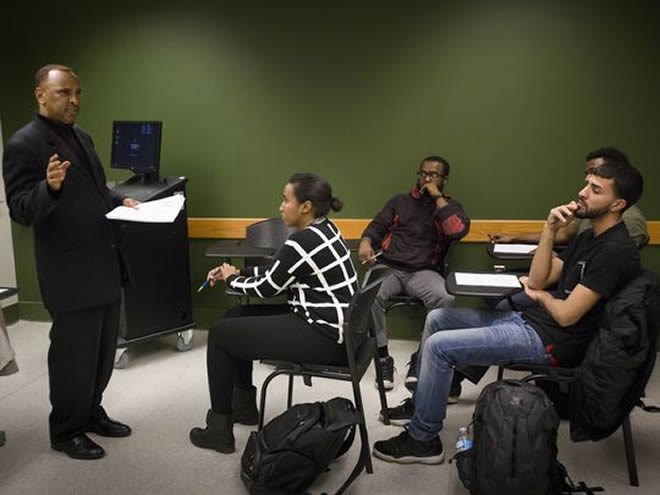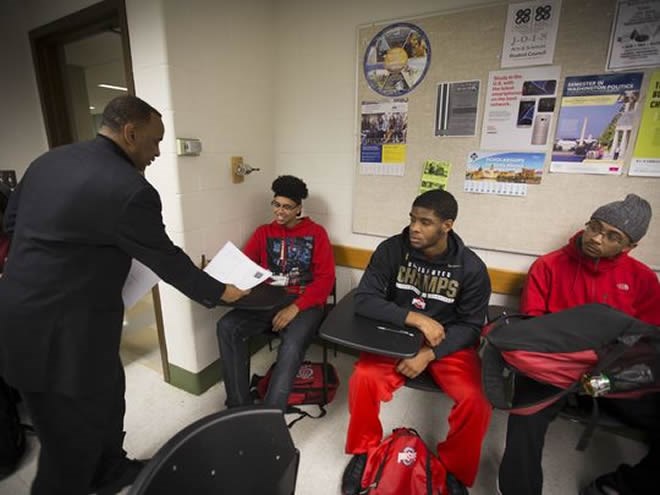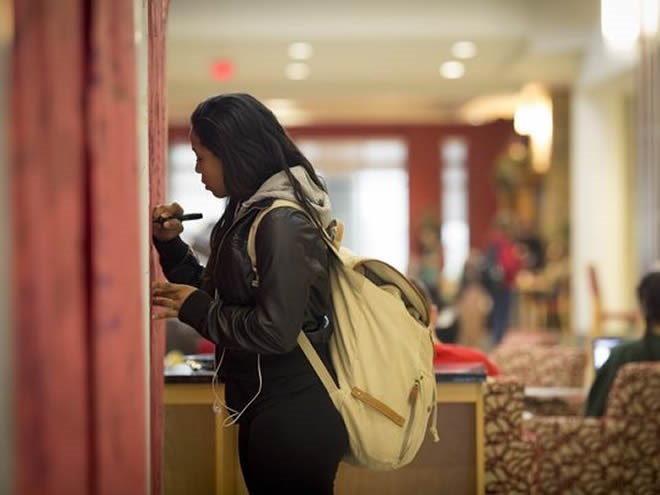
Friday, December 02, 2016
Kate Murphy
Professor Mohammed Omer walks among students at Ohio State University, but his stride is different now than when he was their age.
At 20, he was escaping a violent civil war in Somalia, so the trip from the Ohio Union to his classroom across campus feels like a breeze.
On Monday, Omer’s new home was under attack, after a Somali student rammed a car into a crowd and stabbed multiple people with a butcher’s knife.
He walked into class on Tuesday to a group of students who looked “terrified” because they didn’t know what would happen to them next, he said.
“You could feel there was a fear. I could see that from their faces,” Omer said. “My main goal was to cool them down.”
He told them he wanted them to talk about the incident and to help eliminate the negative image of Somali-Americans being spread on social media.
“That doesn’t represent our community, who we are,” Omer said of the actions of attacker Abdul Razak Ali Artan, a Somali refugee and Ohio State student who authorities said might have been inspired by representatives of al-Qaida and the Islamic State.
Omer fled Somalia and studied in Sudan and Egypt, where he got a job with the United Nations. He came to the United States in 2000 as a refugee and landed in Houston.
Omer moved to Columbus in 2002 and began teaching at Ohio State in 2012, after years of teaching Somali language and culture to law enforcement and in communities across the country.
With more than 50,000 residents, the Somali refugee community of Columbus is the second largest in the United States, behind only that of Minneapolis.

Mohammed Omer, a professor at The Ohio State University in the department of African American and African Studies, hands out the final exam in his Somali language course Wednesday, Nov. 30, 2016, two days after Abdul Razak Ali Artan attacked pedestrians with a car and a butcher's knife. (Photo: The Enquirer/ Carrie Cochran)
As a professor of African-American and African Studies, Omer said it's important to teach his students the Somali language and the value of that culture.
“I have to double my efforts to reach out to as many sisters and brothers at Ohio State University inside and outside the campus,” Omer said. “We are American and we’re not going anywhere. We need to reach out and tell people we are the same as them.”
His students are white, African-American, Asian and African, some of this last group from Somalia, who chose to minor in the Somali language or take the course for a foreign language requirement.
Omer regularly immerses his students in Columbus' Somali community. They eat lunch at family-owned restaurants and drink tea with refugees.
That connection with the Somali culture is what he believes gives his students an understanding of the difference between the values of the entire community and the actions of one individual.
Omer, 46, said to another class Wednesday: “All of you are ambassadors for our community. Because you know the people, the culture and the language.”
Becca Beech, a 23-year-old white student from Columbus, was in Omer’s class Tuesday after the attack.
When she heard the attacker was Somali, she “felt for the community” because she grew up with Somali friends and saw firsthand how they are often misunderstood.
“People are fearful of what they don’t know,” Beech said. “Research shows that we as humans are prone to fearing things we don’t understand or aren't familiar with.”
She said her passion is to be an advocate and a friend for people who aren’t handed an easy life because they are refugees who fled persecution.
Omer said he feels safe to express his identity on campus than away from Ohio State. He said he believes most students at Ohio State, members of the millennial generation, are more open-minded than the general public.

Mohammed Omer, a professor at The Ohio State University in the department of African American and African Studies, hands out the final exam in his Somali language course Wednesday, Nov. 30, 2016, two days after Abdul Razak Ali Artan was shot and killed by an OSU police officer after Artan attacked pedestrians with a car and a butcher's knife. Omer, a Somali immigrant who has lived in the U.S. for nearly two decades, wanted his students to know that the attacker, an OSU student who was also a Somali immigrant, does not represent the Somali community. The Enquirer/Carrie Cochran (Photo: The Enquirer/ Carrie Cochran)
“In the community, that’s where the problem is coming from,” Omer said. “The fear is in the public, not the campus… It might be for a couple of days, but everything is going to be OK here.”
Omer helps make his students believe that, one of his students said.
Marian Siraji, a senior who takes Omer's class, said her peers came in feeling anxious after the attack, and he calmed them down.
Siraji was born in a refugee camp in Kenya and came to the United States as a refugee. She moved to Columbus when she was a child and became a naturalized citizen in 2006.
She spoke of the fear that exists among the younger generation of Somalis when off campus.
"It’s already hard to be Muslim and black in America," Siraji said. "Of course, the women who dress religiously get it worse. They are more visibly apparent so they are more prone to hate crimes."
Siraji said it's mostly outside of Ohio State in Greater Columbus and across America, "where you have that anti-Muslim rhetoric."
"This happening is only going to incite more,” Siraji said of concerns of more such rhetoric in the wake of Monday's attack. "But we are all optimistic. We’re Buckeye strong so we’re going to stick together."
Omer is confident people on Ohio State’s campus won’t “prejudge us to say all Somalis are bad people." He and many of his students received calls, texts and emails from professors in other departments expressing their solidarity with their community.

Jasmine Johnson of Westerville, Ohio writes "love one another and pray for each other" on a public message board in The Ohio State University's student union Wednesday, Nov. 30, 2016, two days after Abdul Razak Ali Artan was shot and killed by an OSU police officer after Artan attacked pedestrians with a car and a butcher's knife. "People are very quick to jump to hatred," Johnson said. "We need to be building each other up." The Enquirer/Carrie Cochran (Photo: The Enquirer/ Carrie Cochran)
“This is a source of knowledge,” Omer said. “We teach and make a difference among communities and kids who are coming from different kinds of backgrounds.
"We believe students coming here, the vast majority are highly educated and open-minded. They will always listen and respond with respect and they are open to new ideas."
The optimism exuded by Omer was reflected at the student center, where students and strangers wrote words of support after the attack.
OSU student Jasmine Johnson of Westerville, Ohio, wrote on the wall: “love one another and pray for each other.”
She said she wrote the message because “people are very quick to jump to hatred."
“If it’s not hard already, it’s going to be even more so for some people here," Johnson said. “We don’t want to let this incident define the entire Muslim group on campus.”